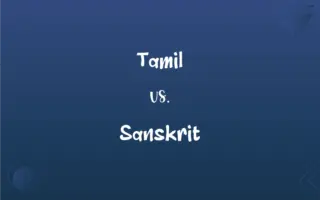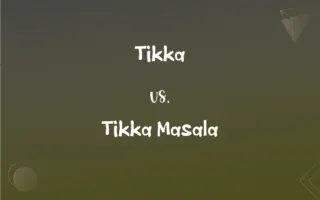Fiction vs. Literature: What's the Difference?
Edited by Aimie Carlson || By Janet White || Published on February 9, 2024
Fiction refers to narrative works created from the imagination, while literature encompasses all written works, both fictional and non-fictional.

Key Differences
Fiction is a genre of writing based on imaginative storytelling, often involving characters, events, and settings that are not real. Literature, a broader term, includes all written works, encompassing fiction, non-fiction, poetry, drama, and more.
Fiction primarily aims to entertain, explore imaginary worlds, and convey themes through storytelling. Literature serves a wider array of purposes, including entertainment, education, cultural preservation, and reflection of societal values.
Fiction can take various forms like novels, short stories, and fantasy. Literature includes these fictional forms, plus non-fictional genres like essays, biographies, and academic writings.
Fiction has evolved through various movements and styles, reflecting cultural and historical contexts. Literature, encompassing all written works, documents and shapes cultural, historical, and philosophical thought across civilizations.
In education, fiction is often studied for its narrative techniques and creativity. Literature studies encompass a broader analysis, including critical thinking, historical context, and linguistic evolution.
ADVERTISEMENT
Comparison Chart
Definition
Imaginative narrative works.
All written works, including fiction and non-fiction.
Primary Purpose
Entertainment and storytelling.
Broader purposes including education, culture, and reflection.
Forms
Novels, short stories, fantasy, etc.
Encompasses all forms including essays, poetry, drama.
Cultural Significance
Reflects cultural narratives and imagination.
Documents historical, cultural, and philosophical values.
Educational Focus
Narrative techniques, creativity.
Critical analysis, context, linguistic evolution.
ADVERTISEMENT
Fiction and Literature Definitions
Fiction
Imaginative writing creating a narrative world.
Her latest fiction novel explores a dystopian future.
Literature
Academic writings or books on a particular subject.
The professor cited extensive literature on climate change.
Fiction
A literary work based on invented content.
The fiction section of the library was filled with diverse stories.
Literature
The study of written works, including analysis and interpretation.
Her degree in literature gave her a deep appreciation for classic novels.
Fiction
Writing that tells stories not based on factual events.
He excels in writing fiction that blurs the line with reality.
Literature
Works of lasting artistic merit and written expression.
Nobel prizes in literature are awarded to writers of exceptional merit.
Fiction
Creative storytelling distinct from factual writing.
Her passion for fiction led her to write captivating short stories.
Literature
All printed materials, including books, articles, and essays.
The library's literature collection spans centuries of human thought.
Fiction
A genre of literature involving imaginary characters and events.
Award-winning fiction often challenges societal norms.
Literature
The body of written works of a language, period, or culture.
Fiction
The category of literature, drama, film, or other creative work whose content is imagined and is not necessarily based on fact.
Literature
Imaginative or creative writing, especially of recognized artistic value
"Literature must be an analysis of experience and a synthesis of the findings into a unity" (Rebecca West).
Fiction
Works in this category
The fiction of Virginia Woolf.
FAQs
What genres does fiction include?
Fiction includes genres like mystery, science fiction, romance, and more.
What constitutes literature?
Literature includes all written works, whether fictional or non-fictional.
Can literature be fictional?
Yes, literature includes fiction as one of its categories.
Are all novels considered literature?
Yes, novels are a form of literature, specifically within fiction.
What is the importance of literature in education?
Literature is vital for teaching critical thinking, culture, and history.
Can literature be purely informative?
Yes, especially in the form of non-fiction and academic writing.
Is poetry considered fiction or literature?
Poetry is a form of literature and can be either fictional or non-fictional.
How do historical events influence fiction?
Fiction often reflects or reinterprets historical events and eras.
What is a literary analysis?
It's the study of literature focusing on interpretation and meaning.
What is fiction?
Fiction is narrative writing based on imagination, not fact.
How is fiction different from non-fiction?
Fiction is based on imagination, while non-fiction is based on facts.
What role does fiction play in literature?
Fiction adds imaginative narratives and creativity to literature.
Can literature be oral?
Yes, oral traditions and stories are also considered part of literature.
How does fiction impact culture?
Fiction can shape and reflect societal values and norms.
Are plays considered literature?
Yes, plays are a significant part of literature.
What distinguishes classic literature?
Timeless appeal, artistic merit, and cultural significance.
How has fiction evolved over time?
Fiction has evolved through various styles and movements, influenced by social and cultural changes.
What skills does studying literature develop?
Analytical thinking, empathy, and understanding of language.
Do fictional works always tell stories?
Mostly, but some experimental fiction may focus more on themes or concepts.
Does fiction have to be entirely imaginary?
It often blends imagination with real-life elements.
About Author
Written by
Janet WhiteJanet White has been an esteemed writer and blogger for Difference Wiki. Holding a Master's degree in Science and Medical Journalism from the prestigious Boston University, she has consistently demonstrated her expertise and passion for her field. When she's not immersed in her work, Janet relishes her time exercising, delving into a good book, and cherishing moments with friends and family.
Edited by
Aimie CarlsonAimie Carlson, holding a master's degree in English literature, is a fervent English language enthusiast. She lends her writing talents to Difference Wiki, a prominent website that specializes in comparisons, offering readers insightful analyses that both captivate and inform.







































































